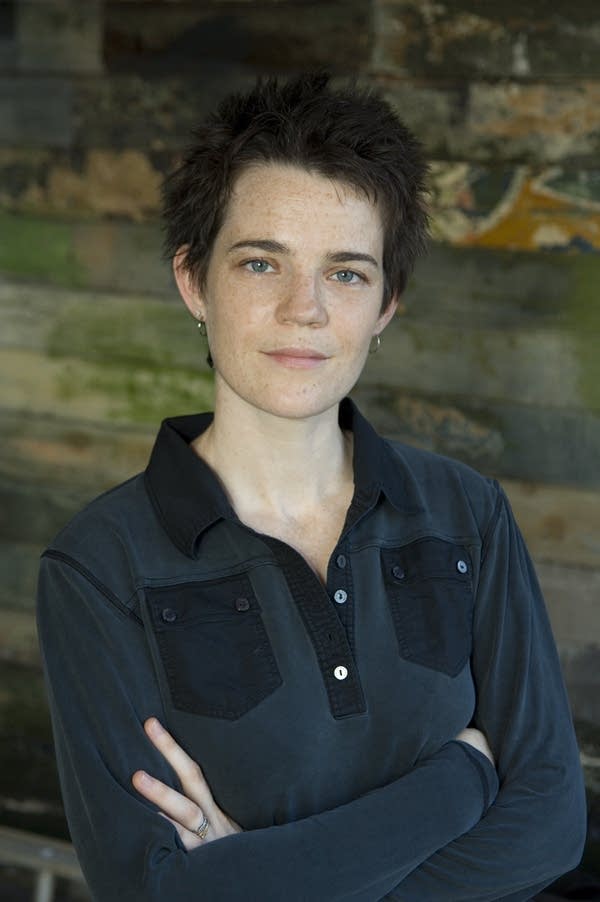A holiday to recall our origins as immigrants
Go Deeper.
Create an account or log in to save stories.
Like this?
Thanks for liking this story! We have added it to a list of your favorite stories.

"What's Thanksgiving all about?" my older son recently asked, giving me a darkly suspicious look.
"Thanksgiving is a time we get together to feel thankful for the good things in our lives," I told him, with the same faint discomfort my parents felt when they told me the same thing.
"But why that specific day?" he asked, again suspiciously. My son is beginning to understand that nearly every American holiday has its dark side -- and the more saccharine the presentation, the more dire the truth probably is.
I told him about the Pilgrims, and Squanto, and how centuries later President Lincoln declared a holiday to commemorate the first Thanksgiving.
Turn Up Your Support
MPR News helps you turn down the noise and build shared understanding. Turn up your support for this public resource and keep trusted journalism accessible to all.
There was a brief silence while the two of us thought about what came after that first Thanksgiving: plague and genocide, poverty, sickness, addiction, forced assimilation, cultural devastation, more death. The fact that we are living on stolen land.
"Bet they wish they hadn't helped us," he said grimly.
My neighbor across the alley, who is Red Lake Ojibwe, seems to wonder about this sometimes, herself. "Immigration is a real problem," she told me. "We should have never let you folks in here in the first place." We both laughed. Indian humor: Tell the truth and make it sound like a joke.
Yes, immigration is a topic of wide ambivalence. I could hear that ambivalence in the awkward pause after I told my son about Thanksgiving, and in the tense laugh I shared with my Indian neighbor.
I think the ambivalence -- especially for white people -- has its roots in complex questions of guilt and fear.
We white Americans will soon be a minority -- and it's hard to imagine a transfer of power and population different from what our founders wrought.
But new immigrants to this country are different from our original forebears (though they may be less different from the later immigrant waves many of us are descended from, such as the Irish, Polish and Norwegians).
Immigration has changed. America has changed. We are a city on a hill not because of our pious religious adherence, as John Winthrop imagined we would be. We are a city on a hill because of our openness to new cultures, because of our democratic process, because of our astounding diversity, and because of our relative peace and prosperity.
Immigrants arrive here for reasons different from those that drove the Pilgrims, fleeing different problems, facing a different future. They are not conquerors with a theology of Manifest Destiny, greeting plagues as a sign from God that they are meant to snatch the land away from those who already live here.
Instead of gifting us with smallpox-infected blankets, for instance, the Mexican immigrants in my neighborhood revitalized East Lake Street with solid locally owned businesses and a vibrant, family-focused culture. Instead of yanking me from my home and forcing me to march at gunpoint across the Mississippi, when my Somali neighbors moved in down the street they introduced themselves and we chatted about Montessori education. My Hmong- and Laotian-American friends, instead of taking me from my parents' home and making me eat rocks whenever I spoke my native language, invite me to their baby showers and poetry readings.
I think we white Americans need to take a deep breath and calm down. If we feel guilty, or defensively angry, or confused about the way we wound up here, we have a chance to do things right this time: to admit that unless we are Native, we, too came from immigrants.
It's a chance to welcome new immigrants with gracious good will and help, as we were welcomed. To be thankful together that we live in this vital, diverse and truly interesting country. We owe Squanto at least that much.
----
Haddayr Copley-Woods, Minneapolis, is a copywriter, blogger and mother.
Dear reader,
Political debates with family or friends can get heated. But what if there was a way to handle them better?
You can learn how to have civil political conversations with our new e-book!
Download our free e-book, Talking Sense: Have Hard Political Conversations, Better, and learn how to talk without the tension.



